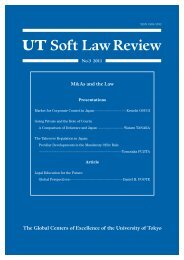UT Soft Law Review
UT Soft Law Review
UT Soft Law Review
You also want an ePaper? Increase the reach of your titles
YUMPU automatically turns print PDFs into web optimized ePapers that Google loves.
<strong>UT</strong> <strong>Soft</strong> <strong>Law</strong> <strong>Review</strong> No.2 2010B. Delaware Court Regulation Of Anti-Takeover Board ConductOnce it was settled (in Delaware at least) that the courts would be the governmentalinstitution to determine how corporate boards should properly respond to a hostile takeoverbid, other fundamental questions still remained for the Delaware courts to decide.1. Who Decides Whether A Bid Goes Forward?The first question was which body within the corporation—the stockholders or theboard—should decide whether or not to entertain a hostile takeover bid? There was no clearanswer to that question. If the acquisition took the form of a merger, the DGCL affirmativelyempowered the board to decide whether the shareholders would be entitled to consider andvote on the transaction. 15 But if the transactional form was a tender offer, no such statutorypower or duty was vested in the board; indeed, the statute did not address tender offers at all.Moreover, a tender offer was in form a transaction between the bidder and the targetshareholders. That suggested that the board should play no role and that the power to acceptor reject the offer should reside in the shareholders alone. This issue was hotly debatedwithin the American corporate community, with no consensus being reached. 16 Not until1985, in its Unocal decision 17 did the Delaware Supreme Court resolve that debate. TheCourt did that by deciding, as a matter of fiduciary law and statutory interpretation, thatwhere a target board has reason to regard a hostile bid as a threat to legitimate corporatepolicy and shareholder interests, the board has the power and the duty to interpose itselfbetween the tender offeror and the target shareholders, and take defensive measures that areproportionate to the threat. This aspect of Delaware corporate jurisprudence became afoundational concept of Japan’s 2005 Guidelines, although the Guidelines limit more strictlythe ability of Japanese company boards to act unilaterally (i.e., without shareholderapproval), than does Delaware law. 1815 See 8 Del. C. §§ 252, 252 (requiring that the board recommend a merger or consolidation to shareholdersbefore shareholders entitled to vote).16 In an article written in 2006, (See Jacobs, Lessons From Delaware, 2 NYU Journal of <strong>Law</strong> and Businessat 333, n. 28), the debate in the U.S. was driven by two interest groups having diametrically opposite views.Takeover defense lawyers (and some academics) argued that board decisions with respect to tender offersshould be treated like any other board decision concerning an acquisition proposal and that the businessjudgment rule should locate the power to deploy defensive tactics with the board. See Martin Lipton,Takeover Bids in the Target’s Boardroom, 33 Bus. Lw y r. 101 (1979); see also Stephen M. Bainbridge,Director Primacy in Corporate Takeovers: Preliminary Reflections, 55 Sta n. L. Rev. 791 (2002). Theplaintiff’s bar, and many academics, took the position that shareholders should ultimately decide whether ahostile bid will succeed, and that the target board should take a passive role. See Frank H. Easterbrook &Daniel R. Fischel, The Proper Role of a Target’s Management in Responding to a Tender Offer, 94 Harv.L. Rev. 1161 (1981); Ronald J. Gilson, A Structural Approach to Corporations: The Case AgainstDefensive Tactics in Tender Offers, 33 Sta n. L. Rev. 819 (1981).17 Unocal Corp. v. Mesa Petroleum Co., 493 A.2d 946 (Del. 1985) (“Unocal”).18 Jacobs, Lessons from Delaware, 2 NYU Journal of <strong>Law</strong> and Business at 336-337, and Notes 35-38. TheGuidelines require that where possible, shareholders should approve a poison pill rights plan in advance; ifa poison pill is adopted by the board, there should be a mechanism that enables the defensive measure to16





